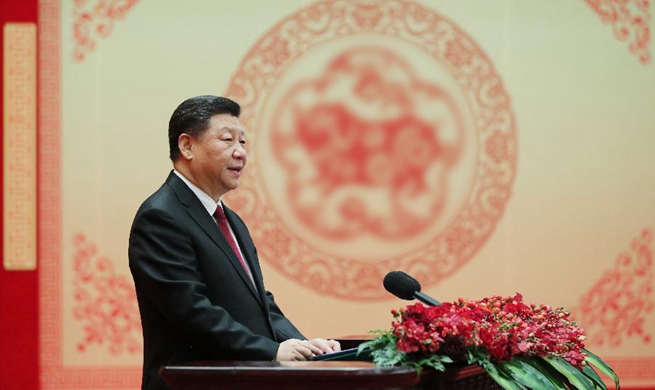ADEN, Yemen, Feb. 4 (Xinhua) -- Representatives of both Yemeni warring factions attended on Monday a meeting for the second consecutive day to discuss the withdrawal of rebel forces from the turbulent Red Sea port city of Hodeidah, a government official said.
The pro-government Governor of Hodeidah Hassan Taher told Xinhua that the team of the Redeployment Coordination Committee (RCC) attended a meeting with the presence of the UN chief monitor Patrick Cammaert aboard a ship over the implementation of Stockholm Agreement.
During the meeting, Cammaert presented his plan regarding the withdrawal of the Houthi rebels from Hodeidah's key ports and listened to reactions from the two-warring factions representatives, the governor said.
Taher said the government representatives voiced support for Cammaert's plan and suggested some slight amendments that included adding a condition of defusing all landmine fields set up by Houthis.
The Houthi representatives refused a number of points included in Cammaert's plan, according to Hodeidah's governor who pointed out that constructive results may be achieved during the next meetings of the RCC.
On Sunday, key topics were discussed during the first meeting aboard the UN-hired ship including reopening main roads for humanitarian purposes and reducing cease-fire violations as well as withdrawing Houthi rebels from the Hodeidah's ports.
Previous meetings were convened in the Houthi-controlled city of Hodeidah but given the tense security situation, Cammaert proposed holding a meeting aboard a ship in order to avoid gunfire attacks, according to local sources.
Earlier this week, Yemen's government accused the Houthi rebels of persistent and deliberate violations of Sweden's agreement on Hodeidah.
In a statement revealed by state-run Saba news agency, the government said 970 Houthi cease-fire breaches have occurred in Hodeidah, killing 71 people and wounding 534 others in 30 days.
The conflict in Yemen started in 2014 when the Houthi rebels overtook the capital Sanaa and forced the government into exile in Saudi Arabia. Since 2015, a Saudi-led coalition, backing the government, has been fighting the Houthis.
The security situation was further exacerbated after the coalition launched in June 2018 an operation to retake rebel-held Hodeidah, a strategic port city that had been handling some 70 percent of Yemen's imports of food.
The fighting has spawned the world's worst humanitarian crisis and brought the poorest Arab country to the brink of famine.
Under the UN auspice, the warring parties reached a deal in Sweden in December 2018, which included a cease-fire in Hodeidah and the formation of the RCC to monitor the withdrawal of troops by both government and Houthis in the area.
Shortly afterward, the UN Security Council authorized an advance team to monitor and support the implementation of the deal for 30 days.
Earlier in January, the UN Security Council adopted a resolution to establish a UN political mission for an initial period of six months to support the Hodeidah agreement.

















